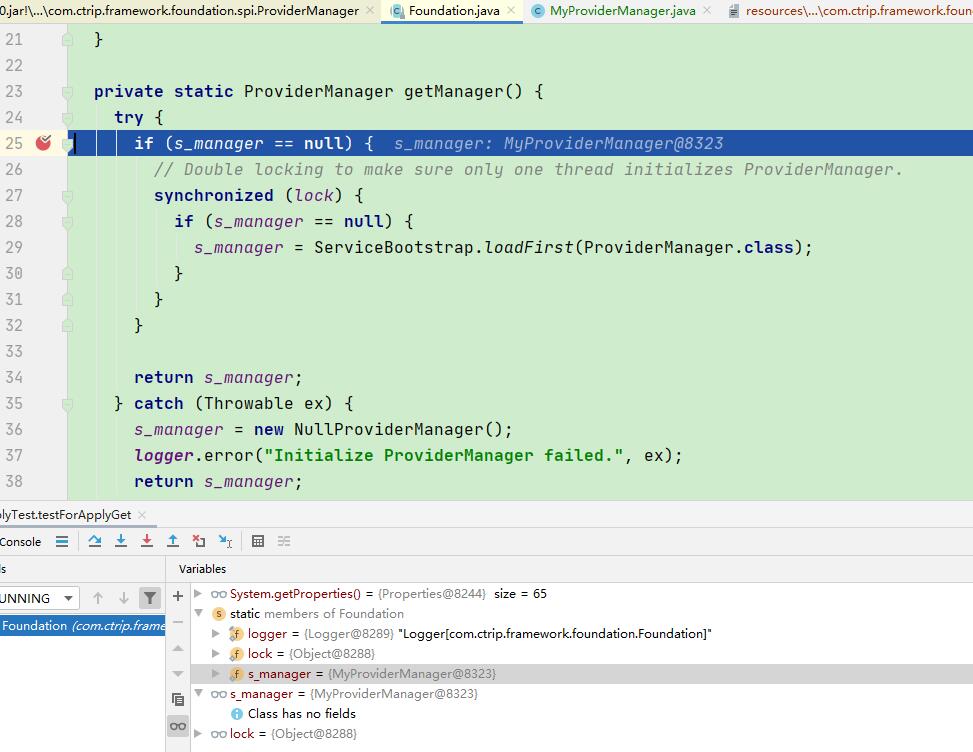改造apollo配置中心客户端支持从Spring读取配置
主要问题
Apollo客户端的配置主要集中在2部分,这就导致割裂了配置,十分不便:
ApolloApplicationContextInitializer
在spring-boot环境下,该类中,通过对配置项apollo.bootstrap.enabled的开启,来达到Apollo在spring-boot环境下的autoconfig,其中主要是initialize方法中,对于指定配置,从spring的properties中加载到system.property里去,因为Apollo本身所有配置都是支持system.property的,所以通过这么实现,可以对原有的配置加载体系没有侵入。
关键代码如下(部分无关代码已省略):
public class ApolloApplicationContextInitializer implements
ApplicationContextInitializer<ConfigurableApplicationContext> , EnvironmentPostProcessor, Ordered {
//对应的会被从spring.properties中转移到system.property中的参数名
private static final String[] APOLLO_SYSTEM_PROPERTIES = {"app.id", ConfigConsts.APOLLO_CLUSTER_KEY,
"apollo.cacheDir", "apollo.accesskey.secret", ConfigConsts.APOLLO_META_KEY, PropertiesFactory.APOLLO_PROPERTY_ORDER_ENABLE};
//实现spring提供的接口,里面进行配置的转移
@Override
public void postProcessEnvironment(ConfigurableEnvironment configurableEnvironment, SpringApplication springApplication) {
// should always initialize system properties like app.id in the first place
//主要就是这个方法
initializeSystemProperty(configurableEnvironment);
Boolean eagerLoadEnabled = configurableEnvironment.getProperty(PropertySourcesConstants.APOLLO_BOOTSTRAP_EAGER_LOAD_ENABLED, Boolean.class, false);
//EnvironmentPostProcessor should not be triggered if you don't want Apollo Loading before Logging System Initialization
if (!eagerLoadEnabled) {
return;
}
Boolean bootstrapEnabled = configurableEnvironment.getProperty(PropertySourcesConstants.APOLLO_BOOTSTRAP_ENABLED, Boolean.class, false);
if (bootstrapEnabled) {
initialize(configurableEnvironment);
}
}
//可以看到只操作了final static数组里定义的那个列表
void initializeSystemProperty(ConfigurableEnvironment environment) {
for (String propertyName : APOLLO_SYSTEM_PROPERTIES) {
fillSystemPropertyFromEnvironment(environment, propertyName);
}
}
//直接把存在的参数加到系统参数中去,有点暴力
private void fillSystemPropertyFromEnvironment(ConfigurableEnvironment environment, String propertyName) {
if (System.getProperty(propertyName) != null) {
return;
}
String propertyValue = environment.getProperty(propertyName);
if (Strings.isNullOrEmpty(propertyValue)) {
return;
}
System.setProperty(propertyName, propertyValue);
}
DefaultProviderManager
另一部分参数,即env以及apollo.configService这两个主要参数,通过DefaultProviderManager类中对DefaultServerProvider的加载实现,这两个类都是Apollo自定义的类,主要功能仅支持从系统变量,jvm启动参数,指定文件目录读取这两个配置。
主要实现代码:
public class DefaultServerProvider implements ServerProvider {
private static final Logger logger = LoggerFactory.getLogger(DefaultServerProvider.class);
private static final String SERVER_PROPERTIES_LINUX = "/opt/settings/server.properties";
private static final String SERVER_PROPERTIES_WINDOWS = "C:/opt/settings/server.properties";
private String m_env;
private String m_dc;
private Properties m_serverProperties = new Properties();
//可以看到主要就是从2个固定的目录去读一个特定的文件,如果读不到,后续就是从系统变量和jvm取了
@Override
public void initialize() {
try {
String path = Utils.isOSWindows() ? SERVER_PROPERTIES_WINDOWS : SERVER_PROPERTIES_LINUX;
File file = new File(path);
if (file.exists() && file.canRead()) {
logger.info("Loading {}", file.getAbsolutePath());
FileInputStream fis = new FileInputStream(file);
initialize(fis);
return;
}
initialize(null);
} catch (Throwable ex) {
logger.error("Initialize DefaultServerProvider failed.", ex);
}
}
//获取参数时的处理
private void initEnvType() {
// 1. Try to get environment from JVM system property
m_env = System.getProperty("env");
if (!Utils.isBlank(m_env)) {
m_env = m_env.trim();
logger.info("Environment is set to [{}] by JVM system property 'env'.", m_env);
return;
}
// 2. Try to get environment from OS environment variable
m_env = System.getenv("ENV");
if (!Utils.isBlank(m_env)) {
m_env = m_env.trim();
logger.info("Environment is set to [{}] by OS env variable 'ENV'.", m_env);
return;
}
// 3. Try to get environment from file "server.properties"
m_env = m_serverProperties.getProperty("env");
if (!Utils.isBlank(m_env)) {
m_env = m_env.trim();
logger.info("Environment is set to [{}] by property 'env' in server.properties.", m_env);
return;
}
// 4. Set environment to null.
m_env = null;
logger.info("Environment is set to null. Because it is not available in either (1) JVM system property 'env', (2) OS env variable 'ENV' nor (3) property 'env' from the properties InputStream.");
}
}
改造思路
java-agent对ApolloApplicationContextInitializer.postProcessEnvironment进行拦截
直接上代码,这里拦截使用了bytebuddy
<dependencies>
<dependency>
<groupId>net.bytebuddy</groupId>
<artifactId>byte-buddy</artifactId>
<version>1.10.22</version>
</dependency>
<dependency>
<groupId>net.bytebuddy</groupId>
<artifactId>byte-buddy-agent</artifactId>
<version>1.10.22</version>
</dependency>
<dependency>
<groupId>org.springframework</groupId>
<artifactId>spring-core</artifactId>
<version>4.3.16.RELEASE</version>
<scope>provided</scope>
</dependency>
</dependencies>
<build>
<plugins>
<plugin>
<groupId>org.apache.maven.plugins</groupId>
<artifactId>maven-compiler-plugin</artifactId>
<configuration>
<source>1.8</source>
<target>1.8</target>
</configuration>
</plugin>
<plugin>
<groupId>org.apache.maven.plugins</groupId>
<artifactId>maven-shade-plugin</artifactId>
<version>3.2.4</version>
<executions>
<execution>
<phase>package</phase>
<goals>
<goal>shade</goal>
</goals>
</execution>
</executions>
<configuration>
<artifactSet>
<includes>
<include>net.bytebuddy:byte-buddy:jar:</include>
<include>net.bytebuddy:byte-buddy-agent:jar:</include>
</includes>
</artifactSet>
</configuration>
</plugin>
<plugin>
<groupId>org.apache.maven.plugins</groupId>
<artifactId>maven-jar-plugin</artifactId>
<version>2.6</version>
<configuration>
<archive>
<manifestEntries>
<Premain-Class>cn.intotw.springconfig.apollo.AgentMain</Premain-Class>
<Can-Redefine-Classes>true</Can-Redefine-Classes>
</manifestEntries>
</archive>
</configuration>
</plugin>
</plugins>
</build>
//拦截主函数
public class AgentMain {
public static void premain(String agentArgs, Instrumentation inst) throws ClassNotFoundException {
System.out.println("进入premain");
System.out.println("isRedefineClassesSupported: " + inst.isRedefineClassesSupported());
new AgentBuilder.Default()
.type(ElementMatchers.named("com.ctrip.framework.apollo.spring.boot.ApolloApplicationContextInitializer"))
.transform((builder, type, loader, module) -> builder
.method(named("postProcessEnvironment"))
.intercept(MethodDelegation.to(SpringConfigInterceptor.class)))
.installOn(inst);
}
}
//拦截器
public class SpringConfigInterceptor {
private static final String[] APOLLO_SYSTEM_PROPERTIES_APPEND = {"env","apollo.configService"};
@RuntimeType
public static void intercept(@Argument(0) Object args1, @SuperCall Callable<?> callable) throws Exception {
try {
initializeSystemProperty((ConfigurableEnvironment) args1);
callable.call();
} finally {
System.out.println("after advice");
}
}
static void initializeSystemProperty(ConfigurableEnvironment environment) {
for (String propertyName : APOLLO_SYSTEM_PROPERTIES_APPEND) {
fillSystemPropertyFromEnvironment(environment, propertyName);
}
}
static void fillSystemPropertyFromEnvironment(ConfigurableEnvironment environment, String propertyName) {
if (System.getProperty(propertyName) != null) {
return;
}
String propertyValue = environment.getProperty(propertyName);
if (propertyValue==null ||"".equals(propertyValue)) {
return;
}
System.setProperty(propertyName, propertyValue);
}
}
其实主要就是对该函数的加载进行拦截,复制一段代码增加一下对自定义参数的读取,原理一模一样。
代码放到github上了[https://github.com/IntoTw/apollo-springconfig-support]
通过Apollo的SPI支持,实现自己的DefaultProviderManager来替换
翻源码的时候发现,Apollo对于DefaultProviderManager提供了SPI支持,所以也可以直接通过实现com.ctrip.framework.foundation.spi.ProviderManager接口,来直接用自己的配置加载实现替代原有实现。

- 在resources文件下新建META-INF/services/com.ctrip.framework.foundation.spi.ProviderManager文件。
- 文件内容为自己实现的接口,代码随便抄抄源码然后改一下就行了。

SPI部分代码:
public class MyProviderManager implements ProviderManager {
@Override
public String getProperty(String name, String defaultValue) {
return null;
}
@Override
public <T extends Provider> T provider(Class<T> clazz) {
return null;
}
}
debug,可以看到此时加载的已经是我们实现的自己的manager了。



 浙公网安备 33010602011771号
浙公网安备 33010602011771号